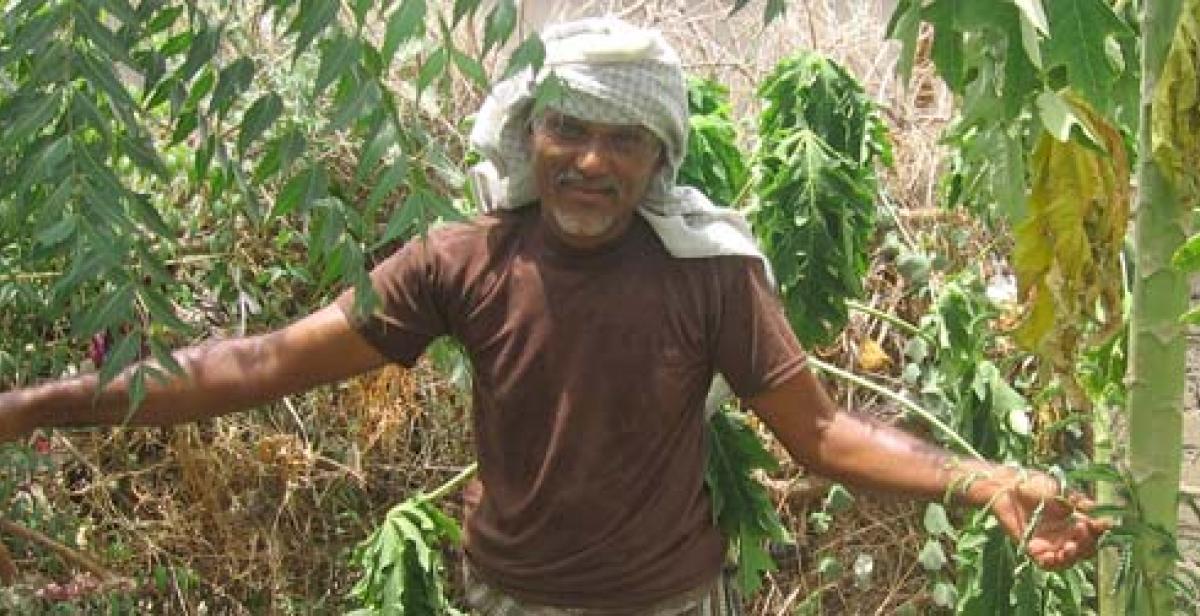Ali Sagheer Sadiq lives in the Al-Sukhna district of Hodeida, Yemen, with his wife and nine children. Our development worker, Derek Kim, has been working alongside Sagheer and other members of the community to help them gain access to a small well and establish kitchen gardens to grow food.
In light of the current food crisis faced by Yemenis, and growing concerns about water scarcity, Derek asked Mr Sadiq how his family are being affected and what life has been like following the Arab Spring.
What’s it like living here?
Life can be difficult here and we have many challenges. There is no one to support us. Life has been more difficult since the political unrest in 2011.
What are the challenges?
The challenges include the absence of diesel because of the political unrest in 2011 which resulted in a rise in price. One barrel of diesel (200 litres) reached YR 80,000 (riyals) (about $330 USD at the time). The difficulties in accessing fuel resulted in a temporary stop of our water supply because we couldn’t afford the diesel used to pump the water. This led to the deterioration of our crops so I think the greatest challenge for us is water.
How was life before Progressio’s support?
Previously we used to buy vegetables from the market, which is 10 kilometres from the village. We had to spend a lot on transportation. The cost of hiring a motorbike, which is the most available means of transportation in the village, was very high. If I had YR1,000 (about $5 USD), about YR500 would go towards transportation costs, leaving very little to buy food.
It costs about YR50 for a bunch of mulakhiya (a green leafy vegetable) and perhaps as much as YR500 for a kilo of tomatoes, for example. The vegetables and other local food items that are available in the market are rarely fresh and healthy.
How can you tell that you have less food than before?
I have a healthy garden but many people have had to abandon their gardens due to the higher cost of water. We grow cereal crops such as corn and millet mainly from rain water, but those crops only just feed my family and are not for sale.
Another local farmer, Omar Ali, said: “I was growing many different crops in my kitchen garden but I could not afford the water needed to irrigate the garden due to the high cost of water, so I gave up on the garden.”
What are the impacts of this to your everyday lives?
Water shortage is very severe. Water may be available only once or twice a week. The water level in the well is dramatically decreasing.
I do not have a private well so we relied mainly on rain water for our crops and carrying water by donkey from a well in the neighbouring village.
What would you like to see happen?
I would like more water to expand my kitchen garden.
How is Progressio helping you to become more food-secure?
The establishment of small kitchen gardens has helped to maintain food security. Progressio development worker Derek has provided support on water management and governance and Progressio partner organisation, Abu Musa Al-Ashari, also drilled a water supply well and provided a diesel pump to complement the kitchen garden projects. In the past we suffered a lot getting water but we now have water thanks to Progressio’s partner Abu Musa.
What has happened as a result?
I am saving on food costs and I need not go to the market as often as before. We have access to fresh and healthy foods. I am very happy with my garden and our water supply well. People are impressed with my garden and want to establish gardens like mine but the reality is that water scarcity remains a critical issue.
What are your hopes for yourself for the future?
I hope to expand my current farming projects, bee-keeping and livestock and to start a small business like opening a small grocery store in the village. I hope to see all my children get an education and to be involved in their own businesses or to be employed, and if opportunity occurs, I’ll even encourage my daughters to study, not just the boys.
What message about food would you give to people in the UK?
Water for agriculture and water supply in general are our biggest challenges. I need 200 gallons of water per week to irrigate my small garden, and getting water is becoming more difficult. We hope for more support in the future because we are now more vulnerable than in the past. We need financial and technical support for agricultural projects at a local level. Thank you again.
Please support Yemen's people by making a donation to Progressio's long-term work in Yemen
Interview and photos by Progressio development worker Derek Kim.



